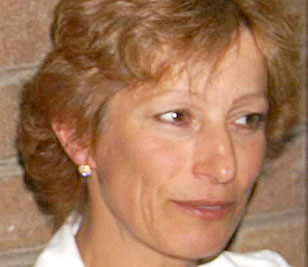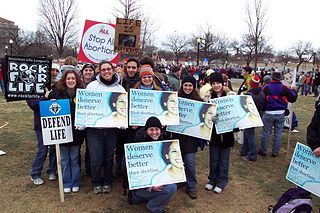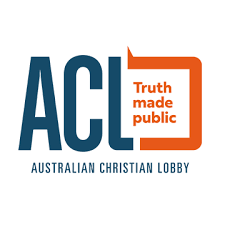Abortion in Australia is legal. There are no federal abortion laws, and full decriminalisation of the procedure has been enacted in all jurisdictions. Access to abortion varies between the states and territories: Surgical abortions are readily available on request within the first 22 to 24 weeks of pregnancy in most jurisdictions, and up to 16 weeks in Tasmania. Later-term abortions can be obtained with the approval of two doctors, although the Australian Capital Territory only requires a single physician's approval.

American Life League, Inc. (ALL) is an American Catholic activist organization which opposes abortion, all forms of contraception, embryonic stem cell research, and euthanasia. Its current president is co-founder Judie Brown and its headquarters is in Stafford, Virginia.

Maria Korp was a Portuguese-born Australian woman reported missing for four days and later found, barely alive, in the boot of her car on 13 February 2005. She spent a short time in a coma before emerging into a state of post-coma unresponsiveness. She became the centre of a controversy in Australia during 2005. Depending upon their viewpoint, people have characterised the controversy as being about euthanasia or about human rights and protecting people with disabilities.

The United Statesanti-abortion movement is a movement in the United States that opposes induced abortion and advocates for the protection of fetal life. Advocates support legal prohibition or restriction on ethical, moral, or religious grounds, arguing that human life begins at conception and that the human zygote, embryo or fetus is a person and therefore has a right to life. The anti-abortion movement includes a variety of organizations, with no single centralized decision-making body. There are diverse arguments and rationales for the anti-abortion stance. Some allow for some permissible abortions, including therapeutic abortions, in exceptional circumstances such as incest, rape, severe fetal defects, or when the woman's health is at risk.
Right to Life New Zealand is a nationwide but Christchurch-based anti-abortion group. It broke away from the New Zealand Society for Protection of the Unborn Child in 2000 following disagreements between the Christchurch branch spokesperson Ken Orr and the national leadership over lobbying tactics. Besides opposing abortion, Right to Life NZ opposes euthanasia, sex education, and specific policies around LGBT issues.

The Abortion Law Reform Association of New Zealand (ALRANZ) is New Zealand's national abortion-rights advocacy group in existence since 1971. Since the decriminalisation of abortion in 2020, the organisation continues to monitor and lobby for changes to the law. The organisation is based in Wellington, publishes a quarterly newsletter, and has its own web site.

Voice for Life, formerly known as the Society for the Protection of the Unborn Child (SPUC), is a New Zealand anti-abortion advocacy group. It has also lobbied against infanticide, embryonic stem cell research, cloning and euthanasia. In recent years, it has strongly campaigned against the decriminalisation of euthanasia in New Zealand as well as abortion, but was unsuccessful in preventing the decriminalisation of either in 2020.
Janice Ruth Munt is an Australian politician who represented the Labor Party in the Electoral district of Mordialloc from 2002 to 2010.

The Australian Christian Lobby (ACL) is a Christian-conservative advocacy organisation based in Canberra.
Governments sometimes take measures designed to afford legal protection of access to abortion. Such legislation often seeks to guard facilities which provide induced abortion against obstruction, vandalism, picketing, and other actions, or to protect patients and employees of such facilities from threats and harassment.

Jacinta Marie Allan is an Australian politician serving as the 49th and current premier of Victoria since 2023. She has been the leader of the Victorian branch of the Australian Labor Party (ALP) since 2023 and has been a member of the Victorian Legislative Assembly (MLA) for the district of Bendigo East since 1999. She previously served as the 29th deputy premier of Victoria from 2022 to 2023. Allan is the longest-serving female minister in Victorian state history and currently the most senior sitting member of the Assembly.
Tamara Louise Lobato is an Australian politician for the Labor Party in the state of Victoria. She was a member of the Victorian Legislative Assembly, representing the electoral district of Gembrook.
Barry Douglas Simon was an Australian politician. Born in Melbourne, he attended the University of Melbourne before becoming a teacher and barrister. He was a member of Berwick City Council and served as its mayor. In 1975, he was elected to the Australian House of Representatives as the Liberal member for McMillan, defeating Arthur Hewson, a member of the Liberals' Coalition partner the Country Party. He was defeated in 1980 by the Labor Party, largely due to the Democratic Labor Party's decision to direct its preferences to Labor in view of Simon's liberal views on abortion. Simon was also targeted by Right to Life organisations, and this was also credited as a factor in his defeat. Simon died in 2004.

Georgia Right to Life (GRTL) is an American 501(c)(4) anti abortion organization that is non-profit, non-partisan, and non-sectarian. It was incorporated in 1971 by Jay and Cheryl Bowman. In 1973, it became the state affiliate of the Washington, D.C.-based National Right to Life Committee in response to the Supreme Court decision of Roe v. Wade which legalized abortion.
The Virginia Society for Human Life (VSHL) is a non-profit organization advocating an end to abortion in Virginia and the United States. VSHL is the Virginia affiliate of the National Right to Life Committee. It was founded in 1967 and is the oldest pro-life organization in the country. The group has a political action committee, VSHL PAC, to support pro-life candidates for Virginia public office. Olivia Gans Turner is the current president of VSHL and the Director of the American Victims of Abortion (AVA).
YourLastRight.com Limited is an Australian national non-profit organisation which lobbies for law reform to permit voluntary euthanasia in restricted circumstances. In August 2012 the West Australian Voluntary euthanasia Society withdrew from the body claiming funding mismanagement and concern over attempts by YourLastRight CEO Neal Francis to initiate defamation proceedings against Exit International and Dr Philip Nitschke for questioning how YourlastRight was spending the Clem Jones bequest funding.

Youth Defence is an Irish organisation that opposes legalisation of abortion. It was founded in 1986, lay dormant, and was reformed in 1992 following the judgment in the X Case. It shared offices with the Eurosceptic group Cóir, but is not openly aligned to any specific political party. It is linked to neo-fascist organisations in Italy, Germany and Great Britain.

Anti-abortion movements, also self-styled as pro-life movements, are involved in the abortion debate advocating against the practice of abortion and its legality. Many anti-abortion movements began as countermovements in response to the legalization of elective abortions.
Phyllis Joyce Bowman, DSG was a British journalist and anti-abortion, anti-euthanasia (pro-life) campaigner.









